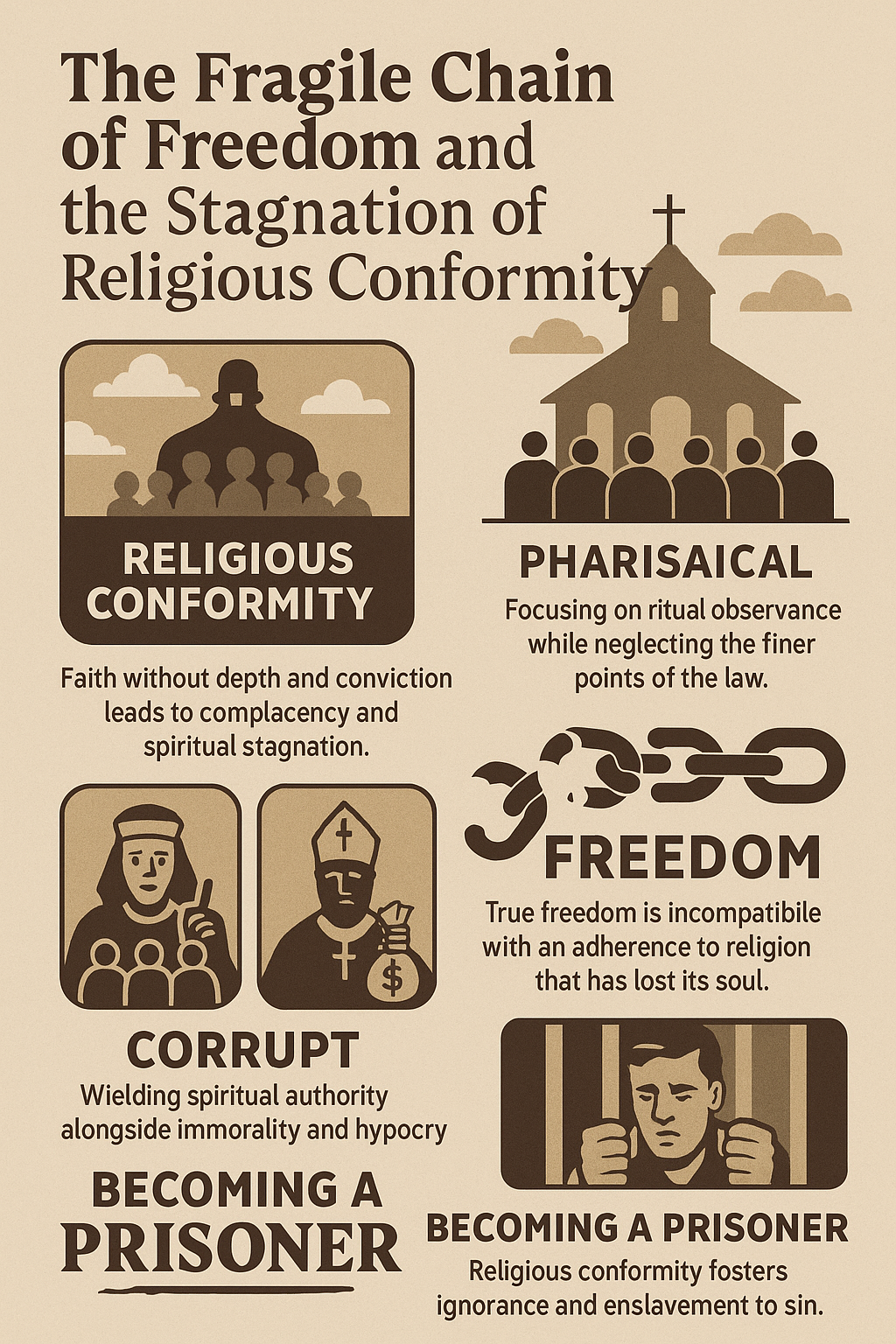Introduction In the cyclical drama of history, the decline of civilizations often follows a predictable trajectory: from spiritual conviction and moral fortitude to apathy, corruption, and ultimately, bondage. This moral descent is not merely driven by overt oppression or foreign conquest but by the internal decay of a people who forget the moral principles that sustain liberty. One of the gravest betrayals in this process is when religious institutions, originally founded to uphold virtue and guide souls to higher purpose, become stagnant forces of conformity.
The Fragile Chain of Freedom and Lawrence Kohlberg The Fragile Chain of Freedom posits that societies rise and fall on the moral fiber of their citizens. It echoes a similar progression to that proposed in Lawrence Kohlberg’s Theory of Moral Development, which identifies six stages of moral growth:
- Obedience and Punishment
- Self-Interest
- Interpersonal Accord and Conformity
- Authority and Social Order
- Social Contract
- Universal Ethical Principles
Stage 6—Universal Ethical Principles—is the stage in which individuals act out of conscience, principle, and a commitment to moral truths that transcend law and culture. This stage represents the highest form of moral autonomy. Ideally, religious communities would cultivate individuals at this level—those who live by virtue rather than fear or approval. Unfortunately, history, and increasingly the present, suggests otherwise.
Religious Conformity: Salt That Has Lost Its Flavor In Matthew 5:13, Christ warned that if salt loses its flavor, it is good for nothing but to be cast out. The metaphor applies poignantly to religious people who, instead of being beacons of virtue and justice, become passive, hypocritical, or authoritarian. They conform to institutional dogma, protect status quo power structures, and reject uncomfortable truths.
Religious stagnation fosters Stage 4 moral reasoning—adherence to authority and order over principle. Ironically, while preaching transcendence, many religious adherents discourage moral growth beyond the institution’s control. They often become the very Pharisees and Sadducees Christ condemned: those who cling to power, tradition, and external righteousness while neglecting justice, mercy, and truth.
Crab Bucket and Five Monkey Syndromes: Cultural Sabotage Two metaphors describe how cultures suppress individual moral ascent:
- The Crab Bucket Syndrome: When one crab tries to climb out, the others pull it back. In societies caught in moral stagnation, anyone striving for higher virtue or radical truth-telling is pulled back by conformists who feel threatened by moral clarity.
- The Five Monkeys Experiment: When new monkeys are introduced to a group conditioned by arbitrary punishments, they inherit irrational behavior by imitation and fear. Likewise, individuals in religious systems often internalize fear and conformity without ever questioning the origin or moral foundation of their traditions.
The Tragedy of the Self-Proclaimed Faithful Religious institutions today are often overpopulated with individuals who claim righteousness yet operate at lower stages of moral reasoning:
- They obey out of fear (Stage 1).
- They serve out of transactional self-interest (Stage 2).
- They conform for social belonging (Stage 3).
- They justify hypocrisy in the name of law and order (Stage 4).
True moral and spiritual revolution—what Paul called the “renewing of the mind”—requires transcending these levels. But many religious leaders and followers actively persecute those who seek this growth. Like Christ and Paul, they are ridiculed, excommunicated, or silenced for challenging idols of politics, wealth, and institutional control.
The Damage to Religion and Society When religious people remain stagnant:
- They lose credibility and moral authority.
- They fail to challenge injustice.
- They become instruments of oppression rather than liberation.
- They stunt the growth of future generations by equating dogma with truth.
This leads to a culture of hypocrisy and cognitive dissonance—where people profess belief in God while serving Mammon (materialism, status, or political allegiance). Such disintegration of principle is foundational to societal collapse.
The Solution: A Return to Stage 6 Moral Integrity Freedom cannot be sustained by citizens who outsource moral judgment to authority. Religious and civic revival depends on:
- Spiritual humility: Acknowledging the gap between one’s beliefs and actions.
- Moral courage: Speaking truth even when it offends institutions.
- Principled leadership: Prioritizing virtue over image or influence.
- Education: Teaching individuals how to reason morally beyond reward/punishment.
- Fellowship: Creating communities that nourish moral clarity, not conformity.
Christ, Paul, and the prophets of old lived in radical fidelity to truth, not institutional comfort. To walk in their footsteps is to risk everything—to lose favor with men, be misunderstood, and possibly suffer. Yet this is the only path to regenerate both faith and freedom.
Conclusion Religious institutions must choose: remain in stagnant moral adolescence or awaken to their higher calling. The Fragile Chain of Freedom can only be repaired by citizens—religious and otherwise—willing to ascend the moral ladder, knowing that history will repeat itself until we do. Let us be the generation that dares to reach Stage 6—not in word only, but in truth and action.





